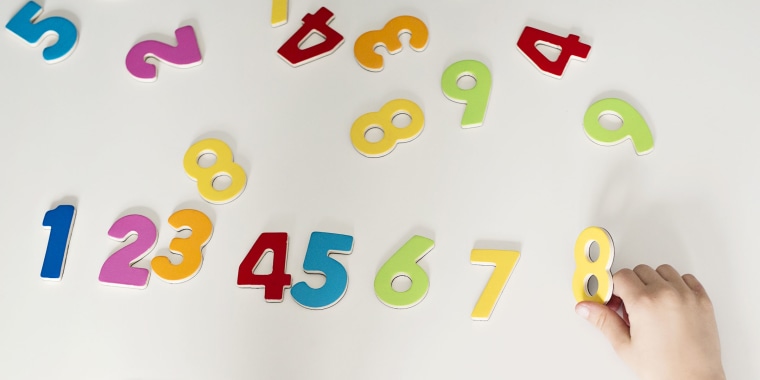Hoping to help your kindergartner with math skills? These basic tips from our kindergarten curriculum guide are what experts suggest.
Incorporate basic math concepts
Try to incorporate basic math concepts into everyday activities. Have your child count objects regularly and pose easy counting challenges, such as counting the number of steps on a flight of stairs or the number of red cars you see while driving. Take opportunities to count by twos or fives or tens, for example, if you've bought many of the same item at the grocery store or need to count a pile of coins.
Practice shape recognition
Practice recognition of different shapes. Have your child spot things that are triangular, like pieces of pizza or the roof of a house, or rectangular, like paper money. As you talk about different shapes, have her describe why a shape she spots is a triangle (three sides) or a square (four equal sides) or a rectangle (two opposite equal sides and two other opposite equal sides of longer length).
Solve jigsaw puzzles
Doing puzzles is a great way to develop important visual discrimination skills, or the ability to recognize differences and similarities in shape, form, pattern, size, position, and color.
Apply math in everyday life
It's especially memorable to children when they can use their new math concepts in their everyday life. Have your child arrange their favorite stuffed animals in a circle for a party and give two or three crackers to each toy. Have them add up the total number of crackers distributed. Ask them to predict how many more crackers they would need if one of their toy action figures joined the party. Then ask them to predict the total number of crackers needed with yet another guest. This gives them an opportunity to "add up" in their heads and then see if they are correct when they actually add the next figure and count up the new total. The game can be played in reverse when one of the figures leaves the party, taking their crackers with them.
Play more or less
Think of a number for your child to guess. After each guess, respond with the words "higher" or "lower." At different times use the words "more" or "less," so your child learns different arithmetic vocabulary. This game helps correlate number words and counting sequence with actual amounts or sizes.
Practice sequencing
Practice sequencing with your child to develop their ability to recognize and store math procedures and number sequences. Make a peanut butter and jelly sandwich or build a snowman together, then ask them to describe in order the actions that took place. Your child can also describe the sequence of events that took place in the day, in a movie they saw, or in a story they read.
Develop an understanding of units of time
Use a timer for activities like watching TV or using the computer, so that your child becomes familiar with the concept of time and how long different units of time last. If your child doesn't want to leave the playground, say they can stay for five more minutes. They will start to develop an understanding of time and how long different units of time last if you do this regularly.
Learn to count money
Give your child a piggy bank and help fill it with spare change. Every month, empty it together and have your child sort the coins by denomination. Have him match the coins to the denominations indicated on coin wrappers, which can be obtained from some banks or purchased inexpensively. This will help your kindergartner with counting, value recognition, and sorting, as well as hand-eye coordination.
Play music
Music is a great way for your child to engage with concepts related to math. Practicing an instrument means learning about tempo, measure, and meter - all of which involve math.
Play family games with math
Plenty of family games incorporate math. Tic-tac-toe, Connect Four, and dominoes are just some of the many games that help build math skills.
To find out what your kindergartner will be learning in math class, check out our kindergarten math skills page.
TODAY's Parenting Guide resources were developed by NBC News Learn with the help of subject-matter experts, including Joyce Epstein, Director, Center on School, Family and Community Partnerships, Johns Hopkins University; Pamela Mason, Program Director/Lecturer on Education, Harvard Graduate School of Education; Denise Walston, Director of Mathematics, Council of the Great City Schools; Nell Duke, Professor, University of Michigan; Leanna Baker, Retired Math Teacher; Bon Crowder, Math Teacher and Blogger, MathFour.com; and Robin Schwartz, VP, Association of Teachers of Math of NYC, and align with the Common Core State Standards.


